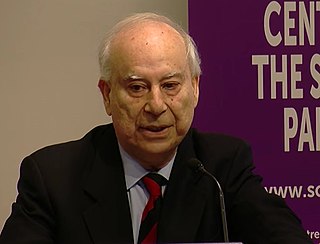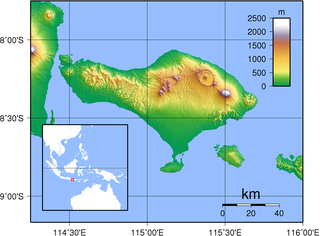Related Research Articles

Bassam Tibi, is a German political scientist and Professor of International Relations. He was born in 1944 in Damascus, Syria to an aristocratic family, and moved to Germany in 1962 where he later became a citizen in 1976. He is known for his analysis of international relations and the introduction of Islam to the study of international conflict and of civilization. Tibi is known for introducing the controversial concept of European Leitkultur as well as the concept of Euroislam to discussions about integration of Muslim immigrants to countries in Europe. He is also the founder of Islamology as a social-scientific study of Islam and conflict in post-bipolar politics. Tibi has done research in Asian and African countries. He publishes in English, German and Arabic.

Clifford James Geertz was an American anthropologist who is remembered mostly for his strong support for and influence on the practice of symbolic anthropology and who was considered "for three decades... the single most influential cultural anthropologist in the United States." He served until his death as professor emeritus at the Institute for Advanced Study, Princeton.
Khaled Abou el Fadl is the Omar and Azmeralda Alfi Distinguished Professor of Law at the UCLA School of Law where he has taught courses on International Human Rights, Islamic jurisprudence, National Security Law, Law and Terrorism, Islam and Human Rights, Political Asylum, and Political Crimes and Legal Systems. He is also the founder of the Usuli Institute, a non-profit public charity dedicated to research and education to promote humanistic interpretations of Islam, as well as the Chair of the Islamic Studies Program at the University of California, Los Angeles. He has lectured on and taught Islamic law in the United States and Europe in academic and non-academic environments since approximately 1990.

Oriental studies is the academic field that studies Near Eastern and Far Eastern societies and cultures, languages, peoples, history and archaeology. In recent years, the subject has often been turned into the newer terms of Middle Eastern studies and Asian studies. Traditional Oriental studies in Europe is today generally focused on the discipline of Islamic studies, and the study of China, especially traditional China, is often called Sinology. The study of East Asia in general, especially in the United States, is often called East Asian studies.

Dan Sperber is a French social and cognitive scientist and philosopher. His most influential work has been in the fields of cognitive anthropology, linguistic pragmatics, psychology of reasoning, and philosophy of the social sciences. He has developed: an approach to cultural evolution known as the epidemiology of representations or cultural attraction theory as part of a naturalistic reconceptualization of the social; relevance theory; the argumentative theory of reasoning. Sperber formerly Directeur de Recherche at the Centre National de la Recherche Scientifique is Professor in the Departments of Cognitive Science and of Philosophy at the Central European University in Budapest.
Saba Mahmood (1961–2018) was professor of anthropology at the University of California, Berkeley. At Berkeley, she was also affiliated with the Center for Middle Eastern Studies, Institute for South Asia Studies, and the Program in Critical Theory. Her scholarly work straddled debates in anthropology and political theory, with a focus on Muslim majority societies of the Middle East and South Asia. Mahmood made major theoretical contributions to rethinking the relationship between ethics and politics, religion and secularism, freedom and submission, and reason and embodiment. Influenced by the work of Talal Asad, she wrote on issues of gender, religious politics, secularism, and Muslim and non-Muslim relations in the Middle East.

Islam is the largest and official religion in Morocco, with more than 99% of the population adhering to it. The largest subset of Muslims in Morocco are Maliki Sunni; other numerous groups include practitioners of Zahirism and non-denominational Muslims. Islam changed many things in Morocco.
Richard Allan Shweder is an American cultural anthropologist and a figure in cultural psychology. He is currently Harold H. Swift Distinguished Service Professor of Human Development in the Department of Comparative Human Development at the University of Chicago.
Sherry Beth Ortner is an American cultural anthropologist and has been a Distinguished Professor of Anthropology at UCLA since 2004.
Legal cultures are described as being temporary outcomes of interactions and occur pursuant to a challenge and response paradigm. Analyses of core legal paradigms shape the characteristics of individual and distinctive legal cultures. "Comparative legal cultures are examined by a field of scholarship, which is situated at the line bordering comparative law and historical jurisprudence."

Akbar Salahuddin Ahmed, is a Pakistani-American academic, author, poet, playwright, filmmaker and former diplomat. He currently is a professor of International Relations and holds the Ibn Khaldun Chair of Islamic Studies at the American University, School of International Service in Washington, D.C. Akbar Ahmed served as the Pakistan High Commissioner to the UK and Ireland. He currently is a Global Fellow at the Woodrow Wilson Center.

Daniel Martin Varisco, is an American anthropologist and historian.

R. S. Khare is a socio-cultural anthropologist and a Professor of Anthropology at the University of Virginia, U.S. He is known for studying “from within/without” India's changing society, religions, food systems, and political cultures, and for following the trajectories of contemporary Indian traditional and modern cultural discourses. His anthropology has endeavored to widen reasoned bridges across the India-West cultural, religious-philosophical, and literary distinctions and differences.

Negara: The Theatre State in Nineteenth-Century Bali is a 1980 book written by anthropologist Clifford Geertz. Geertz argues that the pre-colonial Balinese state was not a "hydraulic bureaucracy" nor an oriental despotism, but rather, an organized spectacle. The noble rulers of the island were less interested in administering the lives of the Balinese than in dramatizing their rank and hence political superiority through large public rituals and ceremonies. These cultural processes did not support the state, he argues, but were the state.
It is perhaps most clear in what was, after all, the master image of political life: kingship. The whole of the negara - court life, the traditions that organized it, the extractions that supported it, the privileges that accompanied it - was essentially directed toward defining what power was; and what power was what kings were. Particular kings came and went, 'poor passing facts' anonymized in titles, immobilized in ritual, and annihilated in bonfires. But what they represented, the model-and-copy conception of order, remained unaltered, at least over the period we know much about. The driving aim of higher politics was to construct a state by constructing a king. The more consummate the king, the more exemplary the centre. The more exemplary the centre, the more actual the realm.
Charles Lindholm is the University Professor of Anthropology at Boston University. He is the author of nine books and over seventy articles and reviews. His writings have been translated into Spanish, Turkish, Chinese, Arabic, and Portuguese.
Byron Joseph Good is an American medical anthropologist primarily studying mental illness. He is currently on the faculty of Harvard University, where he is Professor of Medical Anthropology at Harvard Medical School and Professor of Cultural Anthropology in the Department of Anthropology.
Abdellah Hammoudi is a Moroccan anthropologist, ethnographer, and emeritus professor of anthropology at Princeton University.
Dale F. Eickelman is an American anthropologist with an expertise on Middle East.
Hildred Storey Geertz was an American anthropologist who has studied Balinese and Javanese kinship practices and Balinese art in Indonesia.
Anthropology in Morocco is this article refers to the history, themes, and publications related to ethnography and fieldwork conducted in the country.
References
- ↑ "Lawrence Rosen". Archived from the original on 2011-06-05. Retrieved 2010-02-11. Woodrow Wilson Center, Fellows Biography for Lawrence Rosen, accessed 24 October 2010
- ↑ http://www.princeton.edu/anthropology/faculty/lawrence_rosen/ Princeton University, Department of Anthropology Faculty List, accessed 6 February 2018